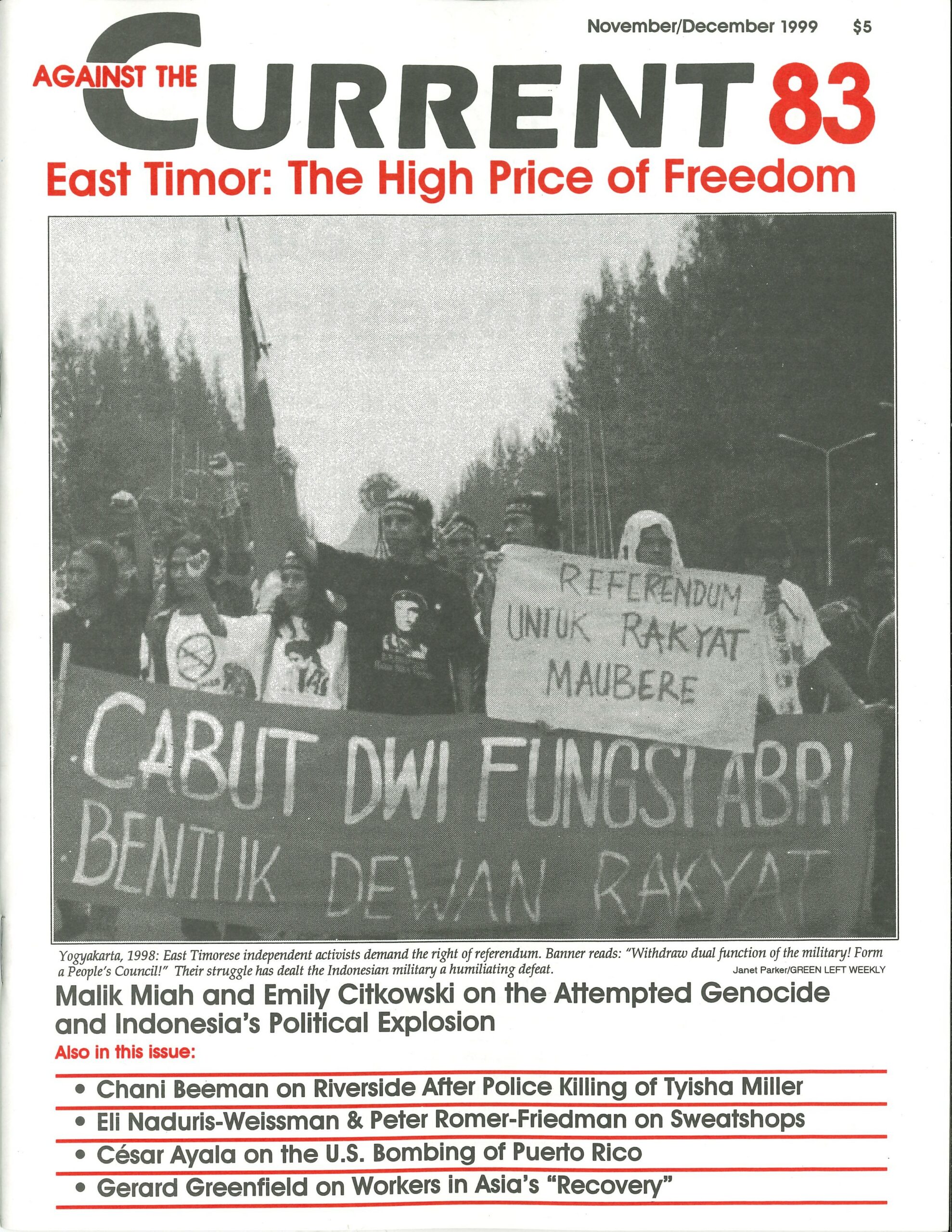Against the Current, No. 83, November/December 1999
-
November 2000: Can We Do Better?
— The Editors -
Puerto Rico: The Real Bombers
— César Ayala -
Update: Mumia Abu-Jamal's Federal Appeal
— Steve Bloom -
Organizing to Stop Police Brutality in Riverside, California: Organizing for Accountability
— interview with Chani Beeman -
Big Three Win A Modular Future: Contract Hype and Reality
— Kim Moody -
East Timor and Indonesia's Political Explosion
— Malik Miah and Emily Citkowski -
Asia: Realities of "Recovery"
— Gerard Greenfield -
Iran: Youth Protests and the Regime's Crisis
— an interview with Ali Javadi -
The Rebel Girl: Whose Population Bomb?
— Catherine Sameh -
Random Shots: Go And Do Likewise
— R.F. Kampfer - Confronting the Sweatshop Industry
-
Student-Labor Activism Advances
— Eli Naduris-Weissman -
USAS Makes Kathie Lee Cry Again
— Peter Romer-Friedman - More on the Battles for Education
-
Claiming What is Ours
— Maria Cordero and Genevieve Gonzáles -
The twLF Hunger Strike: A Critical View--On Tactics and a Broader Mission
— Jared Sexton and Frank B. Wilderson III -
Education for Change: Henry Giroux and Transformative Critical Pedagogy
— Mark Hudson - In Memoriam
-
Michael Sprinker (1950-1999)
— Alan Wald
Steve Bloom
EVENTS ARE MOVING quickly in the case of Mumia Abu-Jamal. At the beginning of October, the U.S. Supreme Court turned down his petition for a writ of certiori, a legal request that the court take up several constitutional issues in the case directly, without waiting for rulings by a lower federal court. The denial of this request was expected, since ninety-five percent of all such petitions are turned down. It simply means that the same legal issues will now become part of Mumia’s regular appeal to the Federal District Court.
The major media in Pennsylvania and nationally, however, played up the Supreme Court’s decision as if it represented a legal end of the line for Mumia (although the major news organizations certainly knew better). The goal, apparently, was to help soften public opinion for Pennsylvania Governor Tom Ridge to sign a new death warrant-which he did on October 13, setting an execution date of December 2.
In the week following Ridge’s action thousands of protesters took to the streets in cities across the country. Some of the youth involved-in places like Chicago and San Francisco-were so outranged that they turned to more militant actions, leading to a number of arrests. Demonstrations also took place in Europe.
On October 15 Mumia’s attorneys filed his appeal for a new trial with the Federal District Court in Philadelphia, and on October 26 a stay of execution was signed. One of the key issues now is whether the justice who has been assigned to the case, William H. Yohn Jr., will hold a hearing where new evidence can be introduced.
This is not required. Yohn could decide to review written transcripts of state proceedings. But Mumia is requesting an evidentiary hearing because there is so much crucial testimony that has been excluded from the written record by Judge Albert Sabo-the pro-prosecution trial judge who also presided over the first phase of Mumia’s state appeals.
Shadowing Governor Ridge
When Pennsylvania Governor Tom Ridge spoke at the conservative group, the Wednesday Morning Club, in Beverly Hills, California on October 27, he found a demonstration of 150 marching outside the posh Regent Beverly Wilshire Hotel, carrying “Stop Tom Ridge Before He Kills Again” signs and chanting “No justice, no peace, ’til Mumia is released.”
Inside, two demonstrators blended in with the luncheon crowd. As Ridge began his address, Lillian Adelman, age 74, stood up and asked: “Why the rush to execute Mumia Abu-Jamal?”
A man next to her, John Parker, unfolded a poster with Mumia’s photo on it and demanded: “Stop the racist execution of Mumia Abu-Jamal!”
The two were immediately surrounded by a dozen Beverly Hills police officers and arrested on misdemeanor charges of trespassing and disturbing a public assembly.
In solidarity with those arrested, demonstrators marched to the police station where the two were being booked, and waited until they were released on their own recognizance.
What Next?
Supporters need to continue organizing political activities around the case. A particular focus will be a letter writing campaign urging Judge Yohn to hold an evidentiary hearing. The next round of regional demonstrations is planned for December 11 in Philadelphia, Chicago and the Bay Area.
Letters requesting a full evidentiary hearing on Mumia Abu-Jamal’s appeal should be sent to: Honorable Judge William H. Yohn, Jr., c/o Leonard Weinglass, 6 West 20th Street, Suite 10A, New York, NY 10011.
Steve Bloom authored Solidarity’s pamphlet, Fighting for Justice: The Case of Mumia Abu-Jamal, and is an activist in the NY Free Mumia Abu-Jamal Coalition.
ATC 83, November-December 1999

